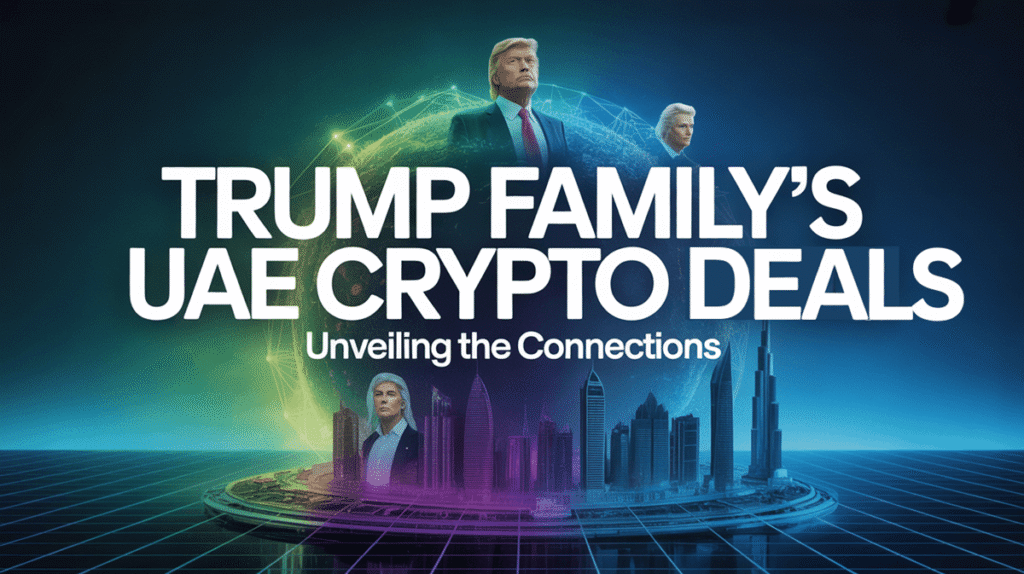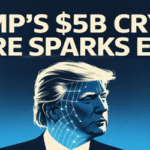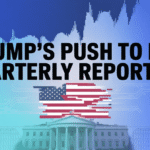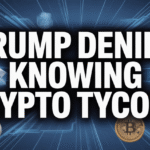Trump Family UAE Crypto Deals Spark Ethics, Security Questions
Key Takeaway: A $2 billion UAE investment into the Trump family’s crypto firm, followed by rare U.S. AI chip exports, fuels national security and corruption debates.
In a series of blockbuster deals, the Trump family’s rapidly expanding cryptocurrency business, World Liberty Financial, has received a $2 billion investment from Abu Dhabi, led by UAE royal Sheikh Tahnoon bin Zayed Al Nahyan. The arrangement—closely followed by U.S. approval of advanced AI chip exports to the UAE—has drawn intense scrutiny from political rivals, ethics watchdogs, and national security experts. The confluence of massive international money flows, policy reversals, and powerful personal networks has ignited concerns over potential conflicts of interest and the blurring of lines between public service and private profit in U.S. foreign relations.

The $2 Billion Deal: UAE Backs Trump’s Crypto
The Trump family’s World Liberty Financial, a decentralized finance venture launched in 2024, promised to “revolutionize global finance” by breaking barriers in banking with blockchain technology. The company’s flagship product is the USD1 stablecoin, a digital asset pegged to the U.S. dollar and marketed for institutional investors.
In May 2025, UAE’s MGX fund, overseen by Sheikh Tahnoon—one of the most influential figures in Middle Eastern finance—poured $2 billion into World Liberty Financial, selecting USD1 as its official stablecoin for a massive digital asset initiative. This investment instantly transformed the Trump firm from a promising startup into a global powerhouse, with tens of millions in new annual revenues secured through lucrative transaction fees and exposure.
AI Chips and Policy Reversals
Just weeks after the investment was announced, the White House greenlit the export of 500,000 cutting-edge AI chips to the UAE—an extraordinary policy change after years of national security-driven restrictions. The chips, produced by top U.S. companies like Nvidia, are vital for artificial intelligence advancements with military and economic implications.
Under President Biden, similar Emirati requests had been denied out of concern that China could gain access to this sensitive technology through the UAE’s close ties to Beijing. The swift reversal and unprecedented scale of the new Trump administration deal left diplomats and analysts questioning whether the deals were coincidental—or linked by powerful cross-border relationships.
Overlapping Interests and Key Figures
The Trump family’s involvement in World Liberty Financial is significant: Donald Trump, his sons Eric and Donald Jr., and his son-in-law Jared Kushner now control a majority stake in the company, giving them direct access to billions in assets.
Steve Witkoff, Trump’s longtime friend and real estate ally, has emerged as both the lead envoy handling Middle East diplomacy and a senior executive at World Liberty Financial. Steve’s son, Zach, co-founded the venture and served as the key negotiator in the UAE deals. The close intertwining of official diplomatic roles and business interests has amplified concerns over inappropriate mixing of statecraft with personal gain.
Regulator Rollbacks and Crypto Windfall
Trump’s return to the White House brought immediate changes to crypto regulation. SEC Chair Paul Atkins, an industry supporter, rolled back many of the enforcement actions that had kept U.S. crypto firms under strict scrutiny. At the Department of Justice, the shutdown of the cryptocurrency crimes division coincided with surging token valuations and new offerings by Trump family-linked companies. World Liberty Financial, meanwhile, racked up hundreds of millions in token sales and expanded operations globally.
The company’s public token sale in September 2025 created an estimated $5 billion in paper wealth for Trump insiders, with the family’s 60% stake now central to their net worth. Major investors, including Chinese business mogul Justin Sun, have joined the project and been rewarded with influential advisory roles, even as U.S. regulatory investigations into Sun’s firms were quietly curtailed after Trump’s inauguration.
Historical Precedents and Trump’s Crypto Pivot
Remarkably, Trump spent years criticizing Bitcoin and digital assets, calling them “scams” as recently as 2021. However, recognizing crypto’s voter appeal, he embraced digital finance during the 2024 election, accepting millions in crypto donations and pledging to make America the “crypto capital of the world.” His family’s embrace of tokens, NFTs, and DeFi in early 2025 marked a total reversal—and opened the door to international partners with interests in both U.S. technology and global influence.
National Security and Ethics Concerns
The pace and structure of these deals—the UAE’s investment, the AI chips export approval, and regulatory turnarounds—have alarmed both lawmakers and watchdogs. Senator Elizabeth Warren labeled the developments “unprecedented corruption,” alleging the deals undermined U.S. interests for private benefit. Analysts note the strategic importance of the AI chips, which are instrumental in military and AI advancements, and warn of “significant risk” that U.S. technology could ultimately aid rival nations through foreign intermediaries.
Experienced ethics attorneys cite the Trump administration’s dual track of private gain and government policy as “an unparalleled conflict of interest.” With Republican majorities in Congress showing little desire for oversight, calls for independent investigations have mounted, though meaningful action remains unlikely in the current political climate.
People Also Read: Trump’s $5B Crypto Empire
The Bigger Picture: A New Model for Influence?
The World Liberty Financial and AI chip saga may well set a precedent for how foreign governments and private U.S. interests interact under future administrations. With both financial and geopolitical incentives aligned, the temptation to blend diplomacy and business has never been higher.
As international scrutiny builds, the Trump family—through its legal representatives and spokespeople—denies all wrongdoing, stating that “the President and his family have observed all appropriate boundaries” and insisting that their crypto dealings are “totally above board.” The broader implications, however, are likely to shape the debate around global finance, technology, and government integrity for years to come.
Sources: Reporting based on MSNBC, The New York Times, Reuters, and other major outlets covering the Trump family’s crypto dealings with the UAE




